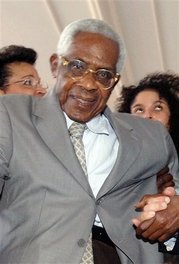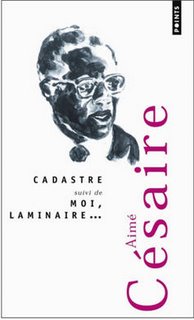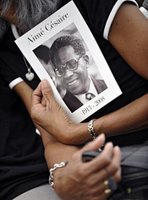Negro I am, Negro I Will Remain
 No doubt it seems a curious thing to say that Aimé Césaire’s death was untimely. After all, the man was 94. Yet it was.
No doubt it seems a curious thing to say that Aimé Césaire’s death was untimely. After all, the man was 94. Yet it was.
Because he died on the tiny French Caribbean island of Martinique last Thursday when virtually all media attention throughout the Americas was focused on the Pope’s historic visit to the United States. And, as a result, neither Césaire’s passing nor his state funeral was accorded the international media attention it was due.
Therefore, to make (woefully modest) amends for this oversight, I decided to wait until today to pay my respects – since the Pope has now returned to the cloistered confines of the Vatican.
Of course, I appreciate that few of you know who Césaire was. And even many of you who do probably find it presumptuous of me to think that eulogizing him merited impinging on the 24/7 media coverage of the Pope.
 Nevertheless, I am certain that my plaintive homage will resonate with anyone familiar with Césaire’s leadership of the 1930s Negritude Movement. Because, defined as “affirmation that one is black and proud of it,” this movement gave rise to black liberation struggles throughout Africa and the Caribbean just as the 1920s Harlem Renaissance gave rise to the struggle for civil rights in the United States.
Nevertheless, I am certain that my plaintive homage will resonate with anyone familiar with Césaire’s leadership of the 1930s Negritude Movement. Because, defined as “affirmation that one is black and proud of it,” this movement gave rise to black liberation struggles throughout Africa and the Caribbean just as the 1920s Harlem Renaissance gave rise to the struggle for civil rights in the United States.
Moreover, just as intellectuals of the Renaissance, including Alain Locke, Jesse Toomer and Langston Hughes, challenged white paternalism and racism, Césaire and others, including Leon Dumas and Léopold Sédar Senghor, challenged the presumptions and prerogatives of colonialism.
Césaire is especially celebrated in this pantheon of black-consciousness pioneers for founding the Black Student Journal in Paris, which promoted and cultivated an Afrocentric pride in the African heritage of black folks. And his 1950 book, Discourse on Colonialism, has become a classic of French literature.
All the same, I’m embarrassed to confess that I knew nothing about him until an English girl tutored my initiation into Afrocentric literature in America 27 years ago. And she set me on life-long quest for racial enlightenment by inducing me to read two of Césaire’s most-celebrated works, namely, his essay “Negro I am, Negro I will Remain,” and his poem “Notes From a Return to the Native Land.”
A Césaire poem explodes and whirls about itself like a rocket, suns burst forth whirling and exploding like new suns—it perpetually surpasses itself.
[John-Paul Sartre]
 But nothing affirmed my racial, intellectual and political affinity for Césaire quite like learning just days ago that, like me, he endorsed Socialist Segolene Royal instead of Conservative Nicolas Sarkozy in last year’s French presidential elections.
But nothing affirmed my racial, intellectual and political affinity for Césaire quite like learning just days ago that, like me, he endorsed Socialist Segolene Royal instead of Conservative Nicolas Sarkozy in last year’s French presidential elections.
Yet it’s a measure of Césaire irreproachable stature in France and throughout Francophone Africa and the Caribbean that, even though he snubbed Sarkozy on more than one occasion, Sarkozy, as president, mounted a successful campaign to rename Martinique’s airport in his honor. More to the point, Sarkozy led a high-profile French delegation, which included his rival Royal, to attend Césaire’s funeral on the island yesterday.
 He was admitted to hospital in his native land on April 9 and was being treated for ailments associated with looming heart failure.
He was admitted to hospital in his native land on April 9 and was being treated for ailments associated with looming heart failure.
A free and independent spirit, he embodied during his entire life the struggle for identity and the richness of his African roots…. Through his universal appeal for the respect of human dignity, consciousness-raising and responsibility, he will remain a symbol of hope for all oppressed people.
[French President Nicolas Sarkozy]
Related Articles:
Césaire obit from the UK Independent
Segolene Royal for president of France
Aime Cesaire
Em Asomba says
Dead, however his soul and writings will always be there to remind us that freedom goes a long to help achieve a sense of belonging when it comes to one’s cultural identify. The ‘Hommage’ paid to this great thinker in Fort-de-France, was one that clearly expanded beyond physical boundaries, as it reached every single one of us to make us fully understand the greatness behind this man and his political and philosophical stature.